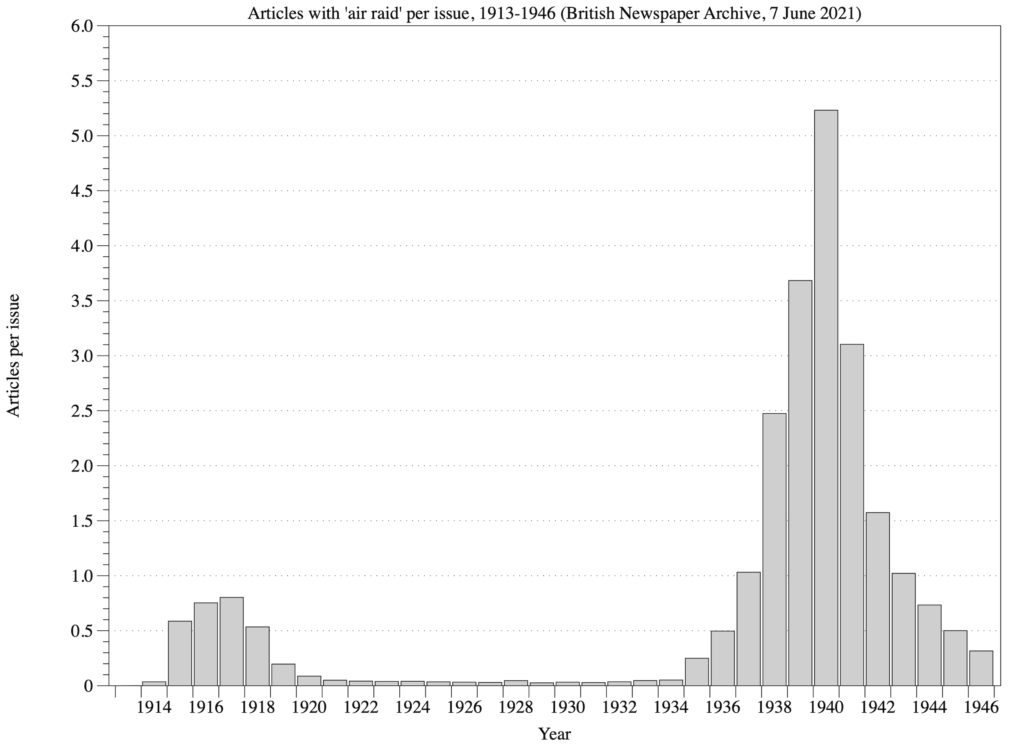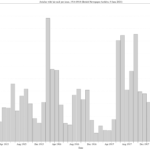
The time has finally come to address the claim I’ve made in the title of this series of posts, that the air raid somehow vanished. Why did I say that, and what does it mean? Well, look at the plot above. Previously I looked at how often ‘air raid’ (and related phrases) appeared per issue in the British Newspaper Archive (BNA) in each month across the First World War. The above plot, now, is how often ‘air raid’ appeared per issue in each year from the start of the First World War (when ‘air raid’ was first used) until the end of the Second. Now you can see that the first peak in ‘air raid”s popularity came in 1917, at an average of 0.8 mentions in every newspaper issue in BNA; and that this was followed by a second, much bigger peak in 1940 of 5.2 mentions in every newspaper issue in BNA. All of which makes sense.
What’s more surprising is what happened in between. From 1921 to 1934, the phrase ‘air raid’ almost completely disappears from BNA. At the lowest point, 1929, the average number of mentions per issue was just 0.026, or one in about 38. In other words, if you read 38 issues you might expect to read the phrase ‘air raid’ once, which is more than six weeks of reading a daily. If you want some absolute figures, ‘air raid’ appears 609 times in the 23054 issues contained in BNA for 1929. So ‘air raid’ was not a phrase you were at all likely to see in a newspaper in the 1920s and early 1930s.
This seems low to me, given the interwar fear of the bomber and all. Shouldn’t ‘air raids’ be something that crops up in the press more than once every six weeks? Even if air raids weren’t actually occurring, wouldn’t there have been discussions of the danger of air raids, or attempts to prevent air raids, or references to wartime air raida? Admittedly, I don’t know frequency what I expected, exactly, but much more than that.
Is this result reproducible? Yes. Trove gives much the same figure (though this is now the percentage of all articles with ‘air raid’, rather than number of articles with ‘air raid’ per issue):

Of course, this is the Australian press, not the British press (which explains the peak in 1942), and Australia certainly didn’t have any particular fear of the bomber between the wars. But much of the reportage about air raids in Australian newspapers was about British air raids, anyway. This plot has a very similar ‘air raid’ void, though starting in 1920 rather than 1921.
Going back to Britain, here’s a Google Books ngram for ‘air raid’ using the 2019 British corpus and a smoothing of 0:
Again this is basically identical. It’s also using a different set of sources, books and periodicals rather than newspapers.
As a final sanity check, let’s go back to BNA and look at a completely different phrase, ‘western front‘:

I chose ‘western front’ because the Western Front is also associated with the world wars, like ‘air raid’. Indeed, the plot broadly similar to the equivalent ‘air raid’ plot at the head of the post, with peaks in the wars and a big trough in between. It’s different, too, of course: the biggest peak is in 1917, with a secondary peak in 1939, when there was in fact a Western Front again, for a short time. And another couple of clear peaks: 1945, when the Western Front came back for the third and final (?) time, and 1930. 1930? That was the peak of the ‘war books’ boom, a flood of memoirs and dramatisations of the war — partly inspired by All Quiet on the Western Front, of course, which was translated into English in 1929 and filmed in 1930. Other than that, the frequency of ‘western front’ in the 1920s and early 1930s is actually about the same order of magnitude as ‘air raids’: it bottoms out at 0.024, in 1926.
Why I think this ‘western front’ is a useful comparator is that, at least between 1919 and 1938, it’s mostly a past term, not a present or a future one. Nobody feared another ‘western front’ in itself (though no doubt some discussions of future war used it as a touchstone), whereas an ‘air raid’ was expected to be a universal and deadly feature of the next war. So when ‘western front’ is burbling along throughout the 1920s (and most of the 1930s) at a low level, it’s because it’s a memory of the last war that nobody, for the most part, actually wants to remember. It’s only with the war books boom or Britain and France facing off against Germany again, that it starts to pop up. The same seems to be true of ‘air raid’. For most of the time air raids are not news. That only changes from 1935 on, with ARP, Abyssinia, Spain, China and the Sudeten crisis. From 1921 to 1934, air raids, future, present or past, are not a pressing concern as far as the British press is concerned.
What does this all mean? A few hypotheses come to mind. One is that ‘air raid’ might not be the only, or even the best, phrase to capture discussions of bombing. (Certainly we can’t infer fear from the searches I’ve carried out here.) Maybe, for example, ‘air raid’ was used as a historical or memory term, whereas ‘aerial bombardment’ was used for future air raids. And it could (instead or also) be that the fear of air raids was an elite concern, not a popular one, at least until the late 1930s. Something to think about.
![]() This work is licensed under a Creative Commons Attribution-NonCommercial-NoDerivatives 4.0 International License.
Permissions beyond the scope of this license may be available at http://airminded.org/copyright/.
This work is licensed under a Creative Commons Attribution-NonCommercial-NoDerivatives 4.0 International License.
Permissions beyond the scope of this license may be available at http://airminded.org/copyright/.



